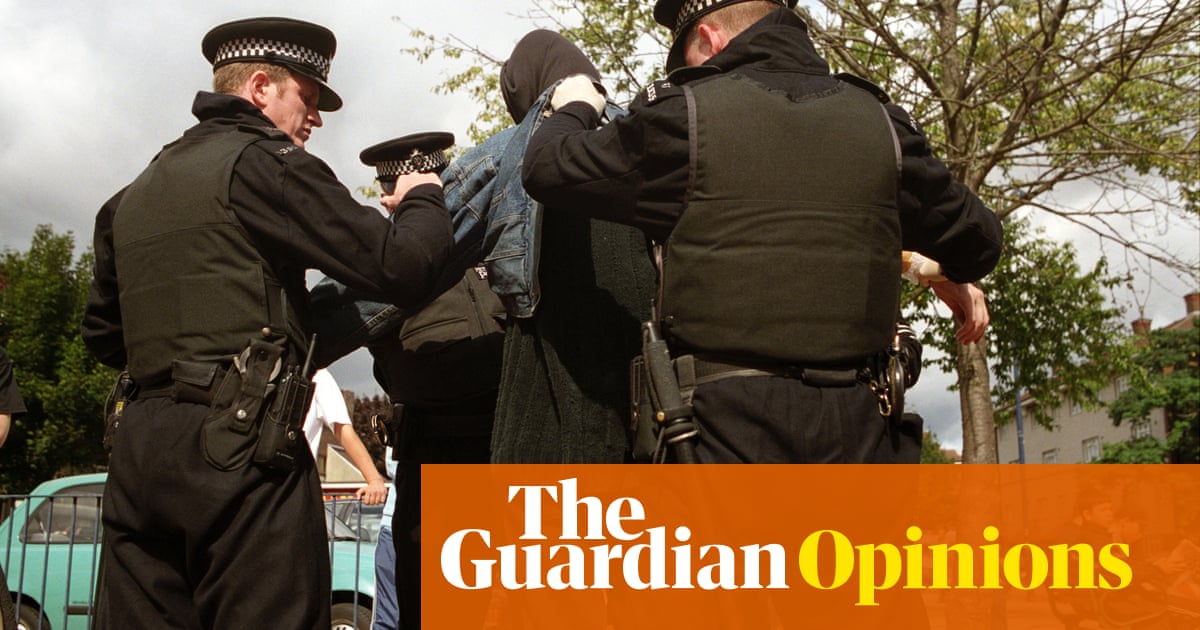
Don’t let them talk to you about freedom. This government is stripping out fundamental liberties with the speed and determination you would expect in the aftermath of a military coup. Knowing that their days in office are numbered, the Conservatives seem to be snuffing out democracy as quickly as they can.
Even before the latest amendment, the public order bill was the most repressive legislation of the modern era, potentially criminalising all meaningful protest. If Rishi Sunak’s new proposal is passed, protests can be stopped before they begin on the grounds that they might be “disruptive”. Disruptive protest was redefined by last year’s Police Act to include noise. Now the definition is being further extended to incorporate “slow marching”. This Minority Report amendment puts us on the wrong side of the law before we even raise our hands in objection.
At the same time, the government is rushing an anti-union bill through parliament that could roll back a century of progress in the workplace. It permits the business secretary, Grant Shapps, to demand “minimum service levels” in the public and service sectors. As the scope of this demand is not defined by the bill, “minimum service levels” are whatever he says they are. His arbitrary powers could, in effect, make industrial action illegal.
This legislation is justified by the government on the grounds that ambulance strikes “result in patchy emergency care for the British people”. Emergency care is patchy all right, but not as a result of strikes. Long waits for ambulances, critical incidents in hospitals, schools heading towards bankruptcy, railways in permanent meltdown and rivers full of shit are the result not of industrial action but of gross misrule by a government that has starved public services of funds while failing to demand effective minimum service levels from private providers.
These police-state measures coincide with a high court ruling perfectly designed to remind us of how such coercive power arose, and how far back the problem goes. It is a judgment of the kind that legitimised our highly concentrated land ownership and the political power that flows from it: a classic act of enclosure terminating the last legal rights of wild camping in England, on Dartmoor. Because written title didn’t precisely specify these rights, they are deemed not to exist, though they are long practised and commonly understood. This is how the commoners of England, Ireland and Scotland were dispossessed. This is how the legal fiction of written title – and the land-grabbing it enabled – was extended across the British empire.
The case was pursued by a man called Alexander Darwall, a hedge fund manager who bought a large estate on Dartmoor in 2011. He used part of his vast fortune to argue that the Dartmoor Commons Act 1985 does not grant the right to camp. It states that the public has a right of access “for the purpose of open-air recreation”. But recreation is not defined by the act. Sir Julian Flaux, chancellor of the high court, decided that as camping is not specifically mentioned, the right does not exist anywhere on Dartmoor. The ruling seems extraordinary, not least because camping doesn’t feature among the “proscribed activities” listed by the act. You could apply the same argument to birdwatching, picnicking, rock climbing, singing, talking, sitting and gazing at the view. If these rights are not specified, according to the judge’s interpretation, none of them exist.
The standard retort of those who seek to justify our political system is that if you don’t like a decision, you should write to your MP. But what do people living in southern Dartmoor do? Anthony Mangnall, who claims to represent Totnes and South Devon, won his seat in 2019 with the help of a £5,000 donation from Darwall, the man who brought the case. Here, in microcosm, is everything that’s wrong with our politics.
There is one remaining means of democratic recourse: protest. But once the public order bill is passed, even writing articles like this could put you in breach of it.
For centuries, laws and rulings of this kind have been justified in the name of “preventing disorder”. Native Americans had to be corralled into reservations while Europeans seized their lands to “prevent disorder”. In Kenya, the Kikuyu had to be rounded up and tortured to death in concentration camps to “prevent disorder”. Strikes and protests must be banned to “prevent disorder”. Wild camping must be terminated to “prevent disorder”. Disorder means any challenge to coercive power.
The Tories bleat endlessly about freedom. But the only freedom they respect is the freedom of the rich and powerful to treat other people as commodities and the living planet as their dustbin. Democracy in this country was only ever skin-deep, our power and personhood delegated to a pantomime performed by 650 people in central London, few of whom are permitted to speak their minds. Without the regular participation that would make the word meaningful, protest is the only vestige of real democracy we retain.
No force in the United Kingdom is as disruptive as the Westminster government, no disorder as great as the disorder it has caused. This is a sick, outdated political culture. In relationships, controlling and coercive behaviour is now a criminal offence. In politics, it is valorised and glorified. It is not just a change of government we need. It’s a change of governance.
George Monbiot is a Guardian columnist












